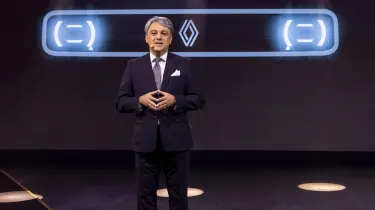
Renault Group boss Luca de Meo has played down the risk of Chinese brands coming into Europe and pushing the established players out of business, suggesting a new spirit of co-operation could help shore up the future of European car manufacturing.
Speaking in response to questions about tariffs on Chinese cars, de Meo predicted a shift in the dynamic between European makers, component suppliers and the incoming brands.
“They might have to think about localising production, integrating differently in a deeper way into the ecosystem, which is actually what they asked us to do [when we went into China] 20, 25 years ago,” said de Meo, speaking at the Paris Motor Show. “Maybe the Chinese can help, doing joint ventures, financing things; instead of doing that in China, they do it here, so they can take part.”
De Meo pointed out that the new Chinese brands are not the first to try and enter Europe and played down the risk of a complete takeover. “I'm old enough to have seen the Japanese and then the Koreans come in to Europe, and it was before my time professionally but also the Americans with Ford and GM.
“You add up American, Japanese and Koreans and you’re at 25% of the European market, and not 95%, and we're still there; actually, last year, Renault had the best result in its history,” De Meo continued. “So it doesn't mean we’re going to be wiped out. It's not going to be a walk in the park. We're going to react, we’re going to compete.”
The boss of Renault Group added that European brands will need the experience of Chinese firms with battery technology in particular.
“I always said we need to find a deal with China, because we won't be able to compete and to accelerate the electric vehicle without the support of the Chinese companies that control the mining industry, their chemical refining, their capacity and competence,” he declared. “Most of the gigafactories built in Europe are actually built and designed by Chinese companies, because they have experience.
“I believe that we need to find a deal. This is now the time of discussion, instead of regretting whether the thing went a certain way, and making arguments about opportunity or having important duties or not so,” de Meo concluded. “So what kind of deal can we do, because they want access to the European market, it's a rich market. It's one of the markets that will naturally go electric so they need a share of the cake, and in exchange for that, we probably need some help.”
